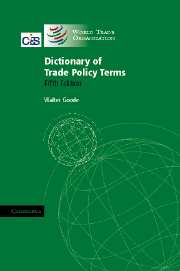Summary
Kaleidoscopic comparative advantage: a term suggested by Jagdish Bhagwati to describe situations of industries in which many countries concurrently have a fragile comparative advantage. In other words, the comparative advantage may change very quickly like the image seen through a kaleidoscope. Slight changes in the domestic environment might in these circumstances bring about a shift of industries across countries as they seek to maintain their competitive edge. This then may result in footloose industries or screwdriver operations. See also globalization and delocalization. [Bhagwati 1995]
Keiretsu relationships: a term denoting complex traditional Japanese distribution systems and industrial conglomerate arrangements seen to make it difficult for newcomers to compete on price. Historically, keiretsu relationships appear to have been based on a desire by firms for continuity of supplies and orders. Today keiretsu relationships are sometimes seen by United States exporters in particular as major non-tariff barriers or restrictive business practices. Japanese commentators tend to argue that the power of keiretsus is overrated, and that the relationships generally are not strong enough to negate price signals. Some distinguish between horizontal keiretsus (arrangements between firms in several sectors) and vertical keiretsus (arrangements between firms at different production and distribution stages in the same sector). See also Market-Oriented Specific Sector talks and Structural Impediments Initiative.
Kennedy Round: the sixth round of GATT multilateral trade negotiations, held from 1963 to 1967.
- Type
- Chapter
- Information
- Dictionary of Trade Policy Terms , pp. 255 - 258Publisher: Cambridge University PressPrint publication year: 2007



